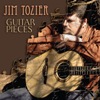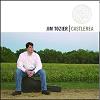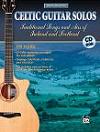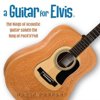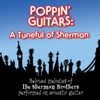| FAQ |
| Recording |
A: Easy... I turn the recording over to someone who really knows how to get a great acoustic guitar sound in the studio—Al Petteway. I know very little about recording myself, so when it's time to record I head to Fairewood Studios and let Al work his magic. Q: What microphones do you use to record?
A: I have to sheepishly admit that since I don't know a whole lot about recording gear, I didn't pay much attention to the equipment Al used when recording my CDs. The best I can do is refer you to the Tech page on Al's website, where he describes the equipment and processes he like to use. From that info, it appears that the mics used would be either Sennheiser MKH-40's or AKG 414 TLII's. I promise I'll pay more attention next time I'm recording! Q: Do you ever use overdubs on your recordings?
A: No... using overdubs to enhance my parts would seem contradictory to the idea of solo fingerstyle guitar. If I can't play it live, I don't want to record it. The exceptions to this, of course, are the duets. All of the duets I've recorded with Al have had his part overdubbed once my part was already recorded. Since we don't rehearse the duets--and in fact, the first time Al heard my parts were when they were recorded--it made sense to have Al add his parts later.
The only duet that was recorded live was "O Come, O Come Emmanuel," with John Sweet. We'd rehearsed the tune ahead of time, and it only took two or three takes to get the recording that appears on the CD. Q: How many takes of each song do you do in the studio?
A: One of the biggest luxuries of home recording is the lack of time constraints, so you're able to do an infinite number of takes (if you have the patience) until you get it just right. In a studio environment, though, when you--or the record label--are footing the bill and time is money, it's rare to have that luxury. So it's essential to really know the tunes well before recording. Even so, it usually requires multiple takes to get to the "sweet spot" while playing. Too few takes, and you're essentially still warming up. Too many takes, and the playing loses energy because of the repetition. Generally, I do four or five takes of each song... with the third or fourth take usually being the best. The first and last takes I do are almost "throw away" takes, because with the first one I'm not really warmed up to the tune yet, and on the last take I know I just had a good take previously but feel compelled to do another one "just in case." After the last take, Al and I will listen through them and decide which one has the best feel and the best playing. Then we'll use that one as "the" take, and listen to it again to see if there are any rough spots--a note that is slightly flubbed, or a (louder than normal) finger squeak, or maybe a passage that just doesn't have the same energy. Once we isolate any issues, we'll edit the track by splicing in the appropriate note(s) from one of the other takes. It's not as ideal as playing the song perfectly in a single take, but it's a much more practical approach in the studio where you have limited time and a limited budget. Al has commented that it's very easy to edit my songs because the timing of the individual takes are almost always identical. (Obviously, it wouldn't work if you tried to edit together parts of two takes that were played at different tempos... not without major studio magic, anyway.) And oddly enough, I never use a metronome in the studio because I find it distracting. What we've discovered is that I've memorized the tempo just as much as any of the notes... so in my head, I hear the same tempo for the song every time. This is very helpful indeed--but it actually makes it a challenge if you want to try playing the song at a different tempo. I still remember Al suggesting that I try one tune at a slower tempo, and when we compared it to the previous take, it was still identical. "Sorry, Al," I said. "That's just the way the song goes." And for me, it's true... once I lock in the tempo it just doesn't feel right if I play it slightly faster or slower. Q: If I'm reading the liner notes correctly, it appears that you recorded the Solo Guitar and Celtic Guitar CDs during the same week. Isn't that, well... crazy?
A: While I didn't think so at the time I decided to do it, yeah, I'd have to say that recording two CDs in one week was a little nuts. OK, a lot nuts.
The idea, of course, was to make the most efficient use of the studio time... and I figured I had the songs down, so why not? I think I underestimated, however, just how draining it would be. I ended up recording 37 songs in a single week, which meant that I'd also spent a lot of time rehearsing those songs before going in to the studio. When you also factor in that we did four or five takes of every song and then spent time editing them, etc., it ends up taking a lot of time and energy. And since I was also doing these recordings for my first releases on Solid Air Records, there was additional stress because I wanted them to be the very best I could offer--which, of course, is very difficult when doing so much in such a short amount of time.
I ended up being very happy with the results, but I also felt burned out for a while afterwards. It's one of those things that you can say that you're proud of doing... but you'd never want to do it again. From now on, I'll stick to one record at a time! Q: I read somewhere that you prefer not to wear headphones when recording. Why?
A: It just feels unnatural to me to have the extra weight on my head and to hear the guitar through the headphones instead of the natural sound of the guitar in the room. Obviously, I think it's important to closely monitor what's actually being recorded, but I let Al worry about that since he's going to be the one who adjusts the microphone placement, recording levels, etc. That allows me the luxury of playing the songs the way I'm used to playing them, rather than wearing headphones and hearing something different while in the studio. Obviously, if I were recording at home I'd have to get used to the headphones... but there's no real purpose for doing so when recording with Al. Q: When's the next CD coming out?
A: As of now, there aren't any current plans for a new CD. I've just started playing again after taking an extended break, and I'm not sure what lies ahead. Right now, I'm just falling in love with the guitar all over again, and not worrying about recording or performing. The music industry has also changed significantly in the past few years, and as downloading music becomes more and more popular, it becomes harder to justify physical CDs—especially for someone who isn't a full-time musician and who specializes in instrumental guitar. But who knows? I'd certainly love to do some more recording at some point.

